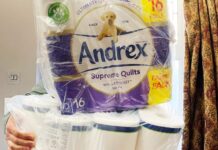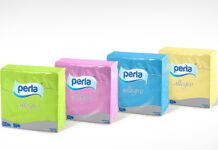London based Mark Hendriksen is a researcher and blogger about the world of toilets, with humorous and educational health related books to his credit. He’s an entrepreneur with a successful career in tourism publishing, a problem solver, a yogi and a part time traditional sourdough baker, and the award-winning owner of The Merchant’s House Boutique Hotel/B&B on Corfu, Greece. His report was written pre-lockdown.
At home in London, I like to ensure that we choose products from the eco-friendly options. That applies to toilet paper and pretty much everything else. Availability is still good and new ‘eco- friendly’ brands are constantly emerging, while established ones are improving, all of which is helping to build and sustain the eco-momentum. With the boutique B&B we have in Greece, we have always cared for the environment and chosen the ‘greenest’ options available there too. Though interestingly, in most of Greece (and a number of other European countries) they don’t permit you to put toilet tissue in the toilets, but in bins adjacent to the WCs. It’s a much-debated topic as to why, but it seems that either the pipes are too narrow, they just like to keep the sea clean, or both.
Quality doesn’t always necessarily equate to greater expense and vice versa. Companies like Cheeky Panda, Who Gives a Crap (WGAC), Ecover, smol and Method are all high quality but also offer value. It can be done, and as there’s more demand for products that combine quality + care for the environment, that should result in better prices for better quality becoming more of a standard. What’s really boosted that in recent times is access to product information, and subsequently purchasing, via social media – that has been and remains a game-changer.
Buying environmentally-friendly tissue products is something that I’ve been aware of way back. But the accessibility wasn’t there, nor enough publicity or communication to help the public make informed decisions. I find environment, health and wellbeing of particular importance. I’m a big fan and advocate of companies that are ‘giving back’ e.g. helping third world countries, i.e. 25% of the world population who lack access to basic sanitation/water. If part of the price you pay is for good, then yes, I truly support that.
With the outbreak of Covid-19, in terms of retail and buying habits it’s not directly Covid-19 that is, and has been effecting people and their shopping routines, but the fear. I research and write about the world of loos and my message from day one was: “There is no shortage, other than that created by panic buying.”
Another consideration is the number of people using face tissues or kitchen roll as a toilet paper substitute, and being blissfully unaware that these don’t break down like toilet paper and further clogs up sewers. I’m glad to see there’s been more publicity about this in the past few weeks, but it’s worth repeating until it sinks in.
The unforeseen shopping curveball has disrupted some supply chains and skewed things for a while. We’re beginning to see the end of the tunnel as the ‘hoarders’ who bought excess toilet paper and similar shopping supplies now see that shops are being re- stocked, limitations have been set.
Queuing is helping as well. The main concern now is that the supply chain, transport and logistics keep working. We didn’t feel the need to buy more. We believed that given time and enough social media commentary, things would right themselves – as all the experts had said all along. With some of
the companies we buy from, their main (if not only) purchasing option is online like WGAC and smol. Otherwise, we’ll buy from supermarkets, the likes of Wholefood Market and/or health shops. Mixing it up between online and ‘high street’ is the ideal retail therapy and I personally feel is a better mix for local community, staying sociable (getting out and off the cell phone, etc.), improving neighbourhoods and retaining meeting places.
From a member of the public’s perception and with a degree of general knowledge, the UK is a big-time toilet paper and tissue user. We’re adapting to the environmentally-friendly products but it seems to be a market that’s growing organically.
My prediction that bidets will make a comeback is beginning to come true; it’s becoming a major disruptor in the toilet paper sector and Covid-19, plus the toilet paper stampede has been spotlighting this as an option, and potentially a more permanent fixture in traditionally paper-only bathrooms. Again, it’s another of the potential changes along with ‘bamboo’ toilet paper suppliers, but perhaps these may be the tails (or tales) that start to wag the dogs i.e. the bigger toilet paper manufacturers?
The accessibility of tissue products is widespread, but what has historically been the main influence for consumer behaviour, choice and thinking and still is, is the local culture and their bathroom culture. As these worlds collide, it appears the industry is becoming more creative and aware of how this may affect them in the longer term. For example, the Covid-19 pandemic and the surge in toilet paper and tissue sales has led to consumers abandoning their usual brands in favour of. ‘whatever was available.
It will be interesting to see if, and how many, go back to their previously preferred brands.


































